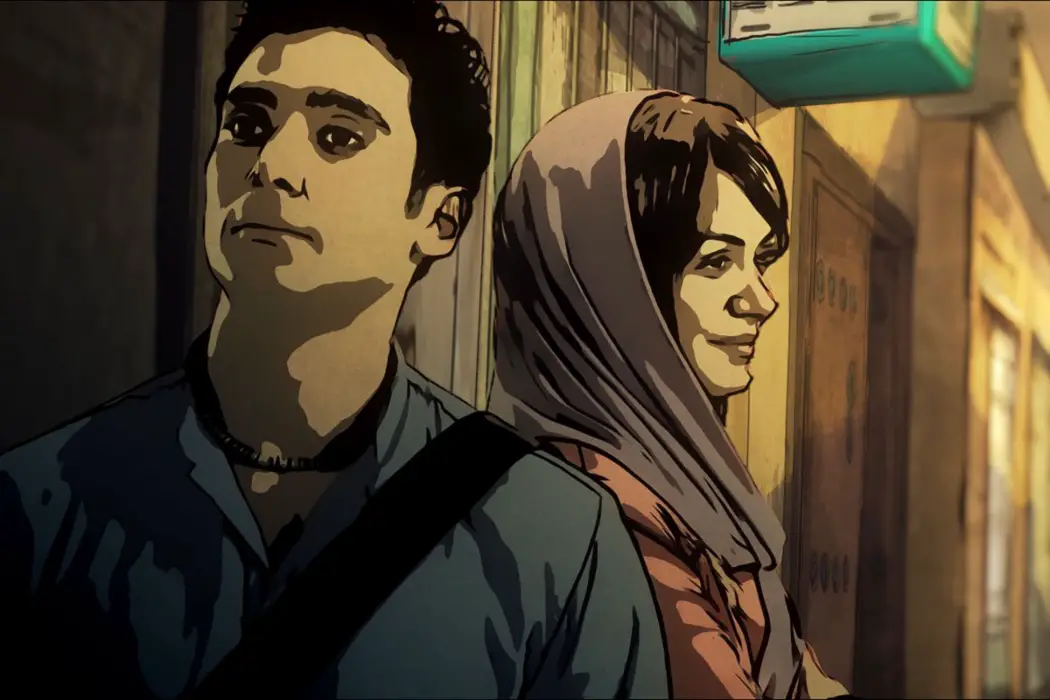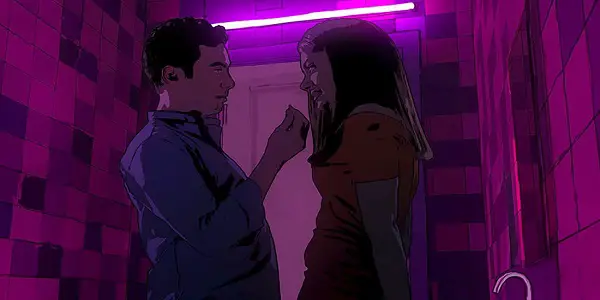TEHRAN TABOO: A Sympathetic Exploration Of Inequality In Contemporary Iran

Charlie Nicholson has written about films and other media since…
Rotoscoping hasn’t really been used in this way before. True, this feature from German-Iranian animator Ali Soozandeh displays the experimental, occasionally hallucinogenic touches employed by Linklater’s rotoscoped Waking Life (and A Scanner Darkly shortly after), but never before has the technique felt so crucial to a film’s production, as well as its aesthetic.
But here we are with Tehran Taboo: a thought-provoking, attractive exploration of the social and sexual restrictions imposed in modern Iran, which makes inspired use of the rotoscoping technique to voice hardships and inequalities that would have otherwise never been allowed past the censors.
In short, the process required its modest cast to act against a green screen, with an eight-strong team of animators tracing over their features and adding them into a fully animated portrait of Tehran, to avoid shooting illicitly in the real Iranian capital. Much more than CGI could have done, the resulting visual style marries live-action cast and animated setting with remarkable authenticity, while also allowing Soozandeh to morph bodies and images with dreamlike appeal. One scene turns an intoxicated one night stand in a nightclub toilet into a momentary, neon trip, squeezing and blurring its subjects into the numb sunrise introducing the next scene.
Odd, lyrical and constantly mobile, this vision of Tehran appears to go against the societal immobility prescribed to its four central characters; far from feeling out of touch, though, it makes for a touching, frequently tough viewing.
Soozandeh has created a thought-provoking, sympathetic and pressing account of inequality in contemporary Iran
First, we meet Pari (Elmira Rafizadeh), who after finding out her husband has been imprisoned, finds herself entering prostitution to support her mute son Elias (Bilal Yasar), who’s a proclivity for dropping large water balloons from tall buildings on the unsuspecting. After applying for divorce to the Islamic Revolutionary Court against her husband’s wishes, the judge (Hasan Ali Mete) agrees to process the divorce in exchange for sexual gratification.
Tellingly, we’re introduced to her as she barters with a cab driver over the price of one particular sexual act while her son sits in the back seat; a funny, yet pondering statement on the dominance of the male breadwinner in Iran, and the limited options that await those women whose husbands can no longer provide support.

Extending the commentary is her pregnant neighbour Sara (Zahra Amir Ebrahimi), who wants to work independently, despite her husband’s insistence that she remain indoors to care for the baby. Meanwhile, the young Donyan (Negar Mona Alizadeh) is coping with the fallout of a one night stand with musician Babak (Arash Marandi), and must now raise money to fund an illegal operation known as a ‘virginity restoration’, which she says will give her the appearance of virginity to allow her to marry with impunity.
Though the pair’s struggle begins as something of an aside to the personal quests of Pari and Sara to achieve independence, the four’s initially separate narratives gradually coalesce to reveal the tragic irony in the expectations of female virginity underpinning Iranian culture. As the damage such can wreak upon the lives of its female citizens is revealed through talk of sex trafficking and ‘virginal prices’, its men continue to flick between advertisements for “Heavenly Wives” and soft-core pornography, detailing the biting friction between expectation and desire in the contemporary capital.
As might be expected, the subject matter enables Soozandeh to create an unavoidably tremulous portrait of relationships in Tehran, the fragility of which is made doubly impressive given that its cast must have been confined to one, green room. Despite its flirtation with the surreal, Tehran Taboo had me gritting my teeth when Pari was reduced to absolute reliance upon corrupt lawmakers, and equally warmed when she and Sara lapsed into hysterical laughter, simply because happier moments seemed to be all too rare in this pointedly rendered city.

Amongst the most affecting scenes are those experienced through Elias. Tapping a wide-eyed innocence that feels subtly neorealist, Bilal Yasar often feels like the unassuming portal through which we – those Westerners who have been privileged enough not to have endured oppression quite like those in Tehran – can only watch with vague understanding and empathetic anger.
Conclusion: Tehran Taboo
But more importantly, his voicelessness proves an intelligent subtext for an oppressed society, in which education and acceptance have been stunted by state-enforced taboos. Elias sees, without being able to tell; as the credits began to roll I was left firmly convinced of the importance Tehran Taboo holds as a means for telling those stories with invaluable compassion.
What did you think of Tehran Taboo? Share your thoughts in the comments!
Tehran Taboo was released in the US on February 14, 2018, and in the U.K on October 5, 2018 . It is slated for a VOD and DVD release on January 14, 2019. For all international release dates, see here.
Does content like this matter to you?
Become a Member and support film journalism. Unlock access to all of Film Inquiry`s great articles. Join a community of like-minded readers who are passionate about cinema - get access to our private members Network, give back to independent filmmakers, and more.
Charlie Nicholson has written about films and other media since 2015, and is approaching his third year studying Film and English Literature at the University of East Anglia. His work can be found on New Game Network, The Independent and Concrete. When he's not expanding his coming-of-age library or buried in a video game, you'll probably find him working on some diorama inspired by eighties-era fantasy. He's also never quite managed to shake his childhood fear of the Gmork. Follow him @Charcolson












